The Gift of South Dakota
Subscriptions to South Dakota Magazine make great gifts!
Subscribe today — 1 year (6 issues) is just $29!
Chased Across Perkins County
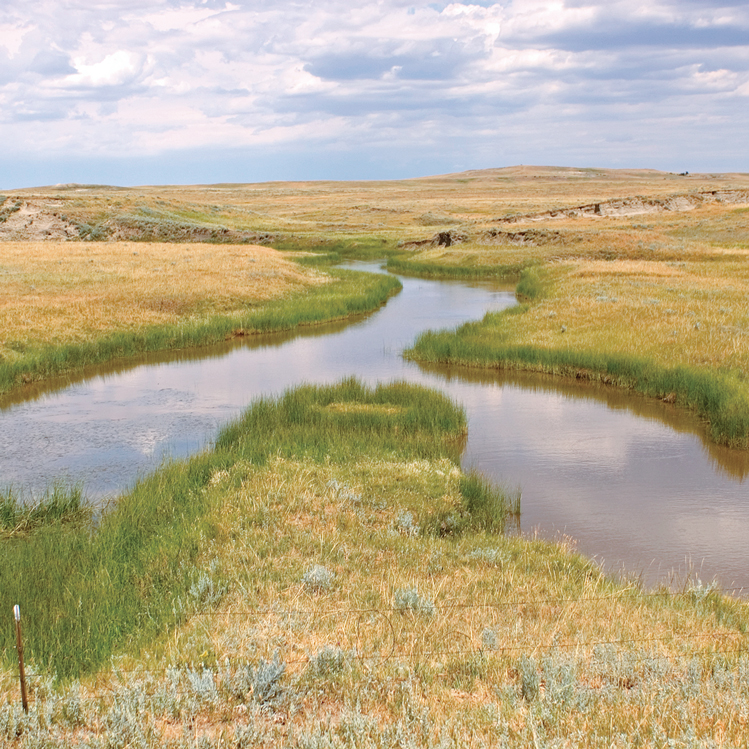 |
| The peaceful Perkins County prairie turned violent one hot summer night in July of 1953. |
It was a hot July Saturday night in 1953, the kind of night that tests your temper. A sad-looking family in a sorry-looking Nash automobile arrived in the small town of New Salem, North Dakota, not far from the South Dakota border. They rented a motel room and at about 10:30 p.m. they parked by the town’s only cafe. The father, Edward Crane, was 32 years old; the mother was a few years younger and dowdy. Their five children ranged in age from 2 to 12. Earning a living for a family of five is hard when the father is AWOL from the Army. In fact it had been six years since the Cranes had a place to call home. They’d been wandering from place to place, often relying on what food could be begged from local churches.
The oldest boy told his dad that a bottle of pop would taste good. Crane gave the boy some change. “Just four bottles,” he said. The boy walked into the cafe. The owner’s plump, blonde wife was behind the counter. Several customers sat at small round tables on twisted wrought-iron chairs with wood seats. The light inside was dim, partly due to years of cigarette smoke blended with bacon grease that slowly darkened the cafe's wallpaper.
“I want some pop — four red ones.” The woman reached for the pop cooler rather slowly and pushed the four bottles across the counter. “That will be 41 cents please.” The boy put four dimes on the counter. “Guess you’ll have to have another penny, Sonny.”
“Don’t have one!” he snapped back. Just then his father and mother appeared at the cafe door.
“What the hell’s holding things up anyway?” the father bellowed, as the clerk held out her hand.
“We have to have another penny to make the governor happy you know.”
“Well, I ain’t payin’ the governor nothin’. The kid has paid for the pop, that’s it,” said the father.
The storekeeper then pushed through a two-way door and came to the counter. He was a large man, a little too heavy but almost handsome with his dark, curly hair. “Listen folks, I don’t make these laws, ya know, but one thing I do in this place is to carry them out, get that?”
The father led the family out the door, leaving the pop on the counter. Before he drove away he fired five shots at the cafe, breaking a window. The owner reached for the phone and said, “I’m calling the cops.”
Within a mile from New Salem, the Nash was overtaken by Police Chief Edward Mumby, accompanied by Walter Hoherz, a friend who farmed near town. “I think you better come with us,” Mumby said to the father.
They were a dismal group, walking across the dark prairie on uneven ground, sometimes stumbling and not knowing which way they were going or where.
Crane didn’t seem scared, but Vera did. Her husband was always in trouble. Now they’d have to follow the police car back into town. The 12-year-old was nervous and quiet; the other two boys were quarreling, hitting one another and unaware of the serious situation. The 3-year-old girl, in a plain grey dress too long for her, looked sad. The youngest child, a 2-year-old, was asleep in the car seat, a sticky baby bottle lying beside her. When the car stopped, flies descended by the dozens. The little girl wiped them from her face with the back of her hand. The sleeping child brushed them away in her sleep.
Crane wasn’t very cooperative as Chief Mumby placed him in the back seat and returned to the front with Hoherz, who was driving.
A flash of panic swept over Crane; everything seemed jumbled up. It was the same old routine. “Read him his rights, too bad we don’t have any place for your wife and kids, don’t you have relatives some place?” His mind was racing; he felt he couldn’t stand being jailed again. He pulled a gun from his shirt and fired wildly. The first bullet hit the back of Mumby and the second went through the roof of the car directly above the driver. The car came to an abrupt stop when Hoherz saw the pistol near his head. His friend had collapsed; blood was oozing from his mouth. Crane made him back the car up so he could load his family in the back seat with him. He waved wildly to his family in the other car as he breathlessly said to Hoherz, “You’re getting me out of this, fella!”
Vera was always submissive. She seemed afraid and helpless. She’d left home at a young age, drifting from one waitress job to another. She married the tall and confident Crane, hoping for security and protection. But babies seemed to come fast. Crane often had a temper when he came home from the Army base at night. It wasn’t what she expected in a marriage. One night he loaded everyone into the car and started driving. He had been in trouble before for forgery. “Oh well, they won’t look too hard,” he said. “There’s plenty of soldiers.”
Now he had killed a man, and he wanted them to leave their car and climb into the farmer’s car with the dead policeman. Why? But she gathered the children and obeyed. The kids were sent to the back seat, and they all headed south for South Dakota on the main road with the frightened Hoherz driving.
Not a word was uttered as the car moved along except for Crane’s constant urging to go faster, then changing to “be careful.” A few miles down the road, he ordered Hoherz to dump the policeman’s body out.
The miles piled up behind them. It was too dark to distinguish figures, but a huge sign by the road made Crane suddenly do some thinking. “Have we crossed the state line?” he mumbled to himself. “Jesus, I’d be in real trouble if I got caught kidnapping. Hold it,” he yelled. “Turn around and go back.”
They returned to a road sign designating the state line. “This is the place,” Hoherz announced.
“Get out,” Crane said. “This is where you start walking.”
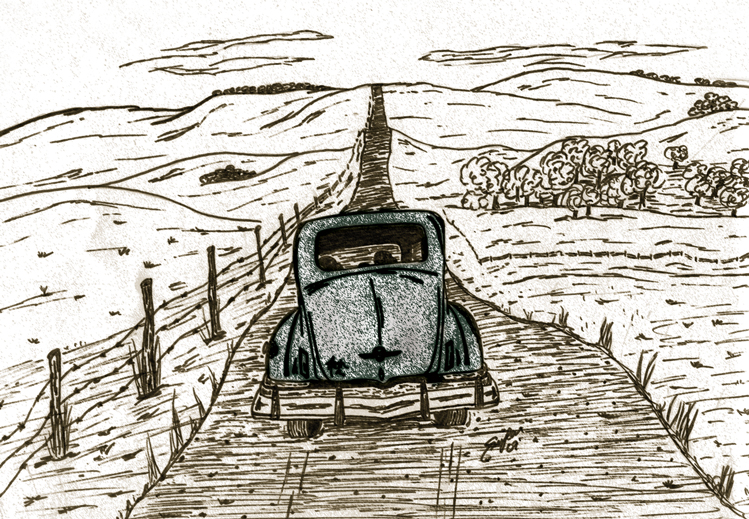 |
| Illustration by Emmylou O'Brien. |
Hoherz tried not to show his relief, outwardly at least, but he quickly brought the car to a stop. Crane ordered Hoherz to show him how to shift the car and how to start it. Then he said, “Give me your billfold. You can keep the money, but I need a new identification.”
The Crane family then drove off into South Dakota, and Hoherz started to shake. “Oh, my God, oh my God,” he said to no one. As the car disappeared out of sight, sounds of the prairie night took over. He made his way to the nearest farmhouse to call the law.
The sunny morning broke cooler, luckily, for the Zeona community picnic had already started. Men came in clean overalls and dress trousers, big hats, caps, bare heads, boots and shoes. The older women wore cleanly starched and ironed print dresses, skirts and blouses; some younger ladies wore slacks.
Food filled a big table made from planks placed on sawhorses — potato salad, fried chicken, meatballs, Mrs. Bekken’s lefse and wieners ready for youngsters to roast over the fire. There was the customary chocolate cake with chocolate frosting, lemon and sour cream raisin pies and homemade ice cream. A copper wash boiler simmered with coffee. Lemonade cooled in a crock borrowed from the rural schoolhouse.
After lunch, the crowd separated intoclusters. Kids played ball and hunted meadowlark nests. Women shooed flies and covered the food, then retired to the farm kitchen of the hostess, Rachel Feryance, to talk about children, gardens and recipes. Men broke up into groups to “talk politics” and exchange news on making hay and their harvesting progress. Not many were aware of news flashes on the local radio stations. “Be on the lookout for a plain black car… man, woman and five children escaped in a car after shooting a police officer in North Dakota over a dispute over a penny sales tax. This man is considered dangerous.”
Meanwhile, Ed Crane had restlessly driven gravel side roads all afternoon in Perkins County, looking for a safe way to get food for the kids and fuel for the car. It was late and dark when he decided they couldn’t go much further. As he topped a slight rise in the road he saw a gate leading into a cow pasture with a well-traveled road; he headed down the trail. Within minutes he found a perfect place to “stash” the black car with the empty gas tank and the bullet hole through the top. It was just under the face of a small stock dam in a deep, short draw in Dale Simon’s pasture. He turned the car abruptly down the steep hill, where it fit under the dam like it was in a box.
“It’s a man and woman with five kids, figure it out for yourself ... ”
Vera remained glum and silent, like she had for the past several hours. The children had whined and complained very little in spite of their discomforts. For a long time no one spoke or moved.
It was getting dark and chilly. Mosquitoes started to buzz in the car windows. Vera finally broke the silence in her tearful way. “Ed, we’ve got to do something.” The smallest child started to cry from hunger. They were at the breaking point.
“So, we’ve got to do something, O.K. What I’d like to know. Go feed you in some fancy restaurant I suppose.” But even as he spoke, Crane knew that sitting in the car on the prairie at night was accomplishing nothing. He opened the door and got out.
They were a dismal group, walking across the dark prairie on uneven ground, sometimes stumbling and not knowing which way they were going or where. Ed was ahead, walking too fast for the rest of them; but the landscape became easier to see as they walked along. A barbed wire fence appeared to their left, small sagebrush and gullies made up the terrain. When car lights showed up, it helped them locate the main gravel road. It seemed like hours had gone by when car lights again appeared, going a short distance and turning. “Maybe there’s a place down there. Maybe we can get food. Oh, let’s rest for awhile,” said Vera. She dropped to her knees, exhausted from carrying the small child.
Finally, the seven walked across the small creek and through a gate to the porch of the farmhouse.
The Hathaways awakened with a start when the knock came on their door. They hadn’t been in bed very long. The picnic and other events of the long day had kept them up. Thank goodness the children had not been disturbed. As they got out of bed, May whispered to Cliff that it might be the fugitive family they heard about on the radio.
Cliff opened the door and was surprised to find it wasn’t a neighbor, but a strange man and woman and five children — cold, dirty and mosquito bitten, a pitiful group. Crane spoke immediately. “Could we get some milk or something for the kids? Our car broke down.”
“Sure, come in. We’ll make some coffee for you. Where is your car? Did you come a long ways?” Cliff talked in the friendly manner common to West River.
May started coffee on the stove and got cookies from the jar. The milk in the large gallon jar was from that night’s milking. Vera meekly handed the baby’s bottle to May, who was taken aback. “That’s what the poor baby has been drinking,” she thought to herself as she took the dirty nipple from the bottle that had a trace of sour milk in the bottom. She rinsed it and filled it with fresh milk. As she handed it to the woman, the baby reached up, grabbed the bottle and sucked hungrily. The other four children devoured milk and cookies. Nothing was said for a while. Cliff, puzzled by the strange group, asked, “Where’d you say your car quit?”
“Oh, a ways back, but a guy came along and is pulling it to town. Our other boy is steering it. Sure hope he gets along all right, the fella was kinda drunk.”
As Cliff pondered their unlikely story, Crane swallowed his coffee and said, “Guess we better go. We’ll wait until they bring the car.” Vera got up, showing signs of deep fatigue and mental strain. They all followed Crane to the door.
The sun wasn’t up, but the sky was light in the east as they walked past the yard gate, then slowly started down the road. Suddenly Cliff was filled with pity. No one should let such small kids face the mosquitoes. “Here, let me take you,” Cliff burst out, and much to May’s surprise he headed toward his pickup. Without much conversation they all crowded into the cab. As Cliff started the motor, Crane said, “Maybe you better take us to Chance. I have a job on a ranch up there.”
Almost certain by now that it was the fugitive family, Cliff said, “If you want to go to Chance, I will have to get some gas at the store.” The 5 miles to the store seemed to take a long time. Cliff was squeezed into the corner of the cab. When the gas pumps appeared before him he felt more comfortable, because he knew there were other people there.
The store was quiet. After a few minutes, Lee Simon, the Zeona store owner and a good friend of Cliff’s, came to the door in his stocking feet. Crane handed Cliff a $5 bill. At the same time, Cliff noticed Crane turning sideways in the seat and he had the uncomfortable feeling that he had a gun. Crane quietly told the oldest boy to go into the store with Cliff. Knowing Lee was without shoes, Cliff said he’d pump the gas. Cliff and the strangers painted an unusual picture so early in the morning. Lee wondered about it, but said nothing until Cliff came inside the store. “What the hell’s the deal anyway?” he asked.
“It’s a man and woman with five kids, figure it out for yourself,” he quietly replied. He left the store quickly and started back down the road in the direction they’d come.
“Something is sure wrong. That’s not like Cliff,” Lee said to his wife, Lillian, as she started breakfast.
The small farmhouse was so quiet. May couldn’t stand the silence when she could no longer see the pickup as it slid up over a rise in the road. She ran to higher ground to see if she could see anything at all. The farther she went the more she trembled, hoping the kids wouldn’t wake up, and still hoping they would break the silence and anxiety. When she returned to the house, she had made up her mind. After breakfast she would go to Cliff’s parents’ home a short distance away and milk the cow, but not tell them about their early morning “visitors.” She knew Cliff’s folks, Cecil and Lena, would panic before she finished telling the story.
Meanwhile, Cliff headed the pickup for Chance. When they had driven about 5 miles down the road, past the Gilbert Dalen place (Cliff’s uncle) and the rural school near the river with cottonwoods and buffalo berry brush, Crane suddenly said, “Stop right here and let us out.”
The family piled out of the pickup. Cliff picked up the old cotton “Indian” blanket he kept in the seat and gave it a toss toward them, pulled the door shut and drove away as fast as he dared. As he stepped on the gas, he slid low in the seat, expecting to hear a gun shot. It didn’t come. When May saw him drive into the yard, she was overcome with joy. But there was still the issue of how to apprehend the wanted man.
Lee Simon was still puzzled when he began to drive to Newell, 50 miles away, to do some carpentry work. Soon he heard a news bulletin on the pickup radio, the same that was broadcast the day before: “Keep on the lookout for a man, woman and five children. The man is wanted for shooting a police officer, considered dangerous.” It was the first time Lee had heard about the man who was wanted for a shooting over a penny sales tax.
That had to be the family in Cliff’s pickup. When he got to Newell, he immediately contacted the county sheriff. By that time, word had already spread to law officials and farmers and ranchers in a large area. Cliff had informed Gail Coe, a local deputy, of the location of Ed and his family in the brush along the Moreau River.
A number of Cliff’s neighbors lived along the river. It was the pattern begun in homestead days; settle close to water, wood and shelter for livestock. Neighbors spread the word by party-line telephone as far as it reached. Raymond Edwards and Gilbert Dalen, who were making hay near the river, were told to keep on mowing and raking as if nothing was wrong.
Strange things happen when excitement runs high and panic takes over. Women seek neighbors for comfort. Hazel Burge went to Polly Edwards, taking her half-risen bread dough along. Lena and Cecil Hathaway hurriedly drove to the location to “see,” well ahead of the officials. Christine Dalen forgot to put on her “bloomers,” as she called her underpants, as she dressed and ran out of the farmhouse. All this happened while Crane hid in the underbrush. But he let the kids wade in the Moreau River, in full view of the people who were driving over the nearby bridge.
By noon vehicles of every kind were heading to the spot north of the river where two roads converged. From the air it looked like a giant anthill, a major departure from the usual tranquility of the rural community. Deputy Coe, a pilot, was instructed to circle above Ed Crane and his family, and to pin-point Crane’s location in the brush. Crane kept moving, but as the local officers approached on foot he dropped his gun and gave up without a struggle.
Edward F. Crane then revealed his real name. His Nash car was registered to Fred E. Werren, one of the aliases he had been using. The family was taken to Bison, and later moved to North Dakota after some disagreement between the two states over who would be responsible for the wife and children. Eventually, Edward Crane was sentenced to 30 years in a North Dakota prison. When the radio news reached all over the United States about Crane, Vera’s relatives in Connecticut notified officials in North Dakota that a legacy of $3,000 had been left for her by her father, who had died several years earlier. No one knew where she was, and she had last seen her father in 1946.
Walter Hoherz’s car was taken to Bison, where the owner picked it up. That gave the Bison and Zeona communities even more to talk about. Whenever the issue arose, Cliff Hathaway’s dilemma was discussed. He couldn’t bear to see the fugitive’s family suffer, everyone said, so he got involved and risked his life.
Editor’s Note: This story is revised from the January/February 2008 issue of South Dakota Magazine. To order a copy or to subscribe, call (800) 456-5117.



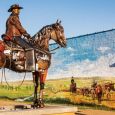

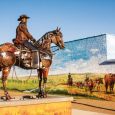
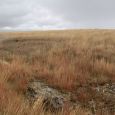



Comments